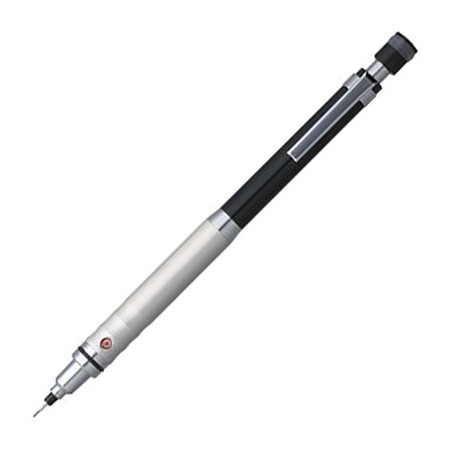Seven Reasons the Mechanical Pencil is a Writer’s Best Friend
The year 2015 marks the 100th anniversary of Charles R. Keeran's U.S. patent for the Ever-Sharp pencil, also known as the modern mechanical pencil. Combined with Tokuji Hayakawa’s Japanese patent from 1920 for the pencil’s metal core, Keeran’s invention paved the way for the mechanical pencils we use today.
I have been using mechanical pencils my entire writing life. If you ask me, the mechanical pencil is a writing tool superior to any other. Therefore, in celebration of the anniversary of Keeran’s patent, here are seven reasons why I believe the mechanical pencil is a writer’s best friend.
Above: Uni Kuru Toga High Grade Mechanical Pencil. The pencil has a gear mechanism that rotates the nano-technology lead each time it touches the paper to ensure the sharpest tip possible. Retail price: $125.
1) It is a combination of a pencil and a pen.
The mechanical pencil is a combination of the best features of a woodcase pencil and a ballpoint pen. A mechanical pencil is made from metal, containing a mechanism that, either through twisting or clicking, extends a solid graphite core to be used for writing. The graphite core, also known as “lead”, is available as refills in several different diameters. For writing, the most common diameters are 0.5, 0.7, and 0.9 mm. The lead also comes in different degrees of graphite hardness, in accordance with the international graphite scale, e.g. H, HB, and B. Just as with a woodcase pencil, you can mix and match diameters and hardness for a personalized writing experience.
2) It never needs to be sharpened.
Keeran called his mechanical pencil “ever-sharp” because it never needs to be sharpened. The reason for this is that when the lead is worn away from writing, all you have to do is use the extension mechanism to create a new pencil tip.
3) It always fits your grip.
When you write with a woodcase pencil, each time you sharpen it you carve away a piece of your writing tool. Soon, you’re writing with a pencil that is too small for your hand. With a mechanical pencil this never happens; it’s the lead that is worn away, not the pencil. When you run out of lead, just refill the pencil and continue writing.
4) It lasts for years.
The longest I’ve used the same mechanical pencil is seven years. Only when the interior mechanism was worn out did I need to buy a new one. Because of the durability of the mechanical pencil, it is a very economical writing tool. The pencil itself can cost anything from a couple of dollars to several hundred, but it’s a one-time expense. The refill lead costs almost nothing.

Aristo D1 Mechanical Pencil. The pencil comes in black with a matt rubber grip, a chrome metal trim, and a long-twist eraser. I used a pencil of this model for seven years before it was worn out from use. Retail price: $10.
5) It is easy to travel with.
The mechanical pencil is an ideal writing tool to travel with because when packing your pencil, you can push the tip into the pencil for storage and protection.
6) It can be dropped on any surface.
Because of Hayakawa’s patented metal core, the lead is protected at all times. In other words, you can drop a mechanical pencil on any kind of surface. The lead will never break.

Graf von Faber-Castell Pocket Pencil. The entire bottom section of the pencil is retractable and protected by a cap. Most mechanical pencils only allow the lead tip itself to be retracted. Retail price: $180.
7) It has a built-in eraser.
How many times have you made a mistake while writing and when you search the desk for an eraser you can’t find it? This never happens with a mechanical pencil. A mechanical pencil comes with a built-in eraser. When the eraser runs out, just replace it with a new one.
This post was written using a Ballograf Rondo Soft mechanical pencil and 0.5 mm HB lead.



